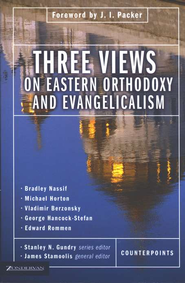Three Views on Eastern Orthodoxy and Evangelicalism
 Stanley N. Gundry and James Stamoolis, eds., Three Views on Eastern Orthodoxy and Evangelicalism, Counterpoints (Grand Rapids: Zondervan, 2004), 294 pages.
Stanley N. Gundry and James Stamoolis, eds., Three Views on Eastern Orthodoxy and Evangelicalism, Counterpoints (Grand Rapids: Zondervan, 2004), 294 pages.
This book is a fine addition to Zondervan’s Counterpoint series, in which controversial theological issues are examined from a variety of stances by reputable scholars and/or denominational leaders. This particular book offers a variety of perspectives on the relationship between the evangelical movement and the oldest Christian community, the Eastern Orthodox Church. Respected evangelical scholar J. I. Packer writes the forward and five pastors and theologians, some evangelical and some Orthodox, offer answers to the question of whether Eastern Orthodoxy and evangelicalism are compatible. All five present their answers (yes, no and maybe) and the other four are given the opportunity to respond to the presenter. The presenting writer is then allowed to respond to the respondents.
Bradley Nassif, an Orthodox theologian with an extensive background in evangelical higher education and ecumenical activity offers the sole affirmative response for the compatibility of these two Christian traditions. Nassif demonstrates not only a thorough grasp of his own tradition but an impressive comprehension and positive assessment of evangelicalism. His primary thesis is that Orthodoxy and evangelicalism are compatible because Orthodox theology is evangelical, whether or not Orthodox adherents and church leadership care to identify it as such. Nassif uses David Bebbington’s fourfold definition of evangelicalism to show Orthodox and evangelical compatibility. First, both groups emphasize “crucicentrism” (centrality of the life, death and resurrection of Christ), “biblicism” (commitment to the inspiration and authority of Scripture), “conversionism” (personal commitment of one’s life to Christ) and “activism” (witness and holy living). Nassif grants that both Orthodoxy and evangelicalism do not often emphasize specific doctrinal elements contained in these basic agreements to the satisfaction of each group, but the agreement is nonetheless there in principle.
Michael Horton, a Reformed evangelical theologian, writes next, denying the compatibility of the two traditions. Horton begins by appreciating the areas of commonality between the two, such as a high view of Scripture and conservative Christology (doctrine of Christ’s person and work). He finds problems, however, with the high view of church tradition espoused by Orthodoxy in relation to Scripture, finding there the same problem he perceives with the Roman Catholic view. Even more fundamentally, however, Horton alleges that Orthodoxy does not possess an adequate view on issues of sin, free will and salvation, particularly with regard to justification and sanctification. He contends that, due to Orthodoxy’s stress on sanctification, it promotes a salvation by works that fundamentally denies justification by faith alone. He claims that the evangelical view denies any role of the human in salvation and that this, in contrast to the Orthodox view, is the true Gospel message.


